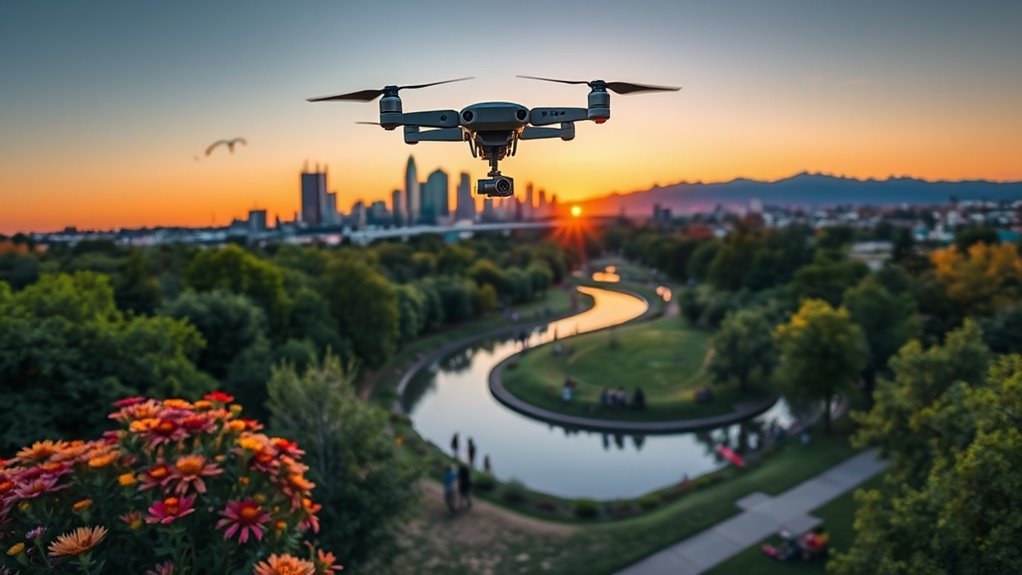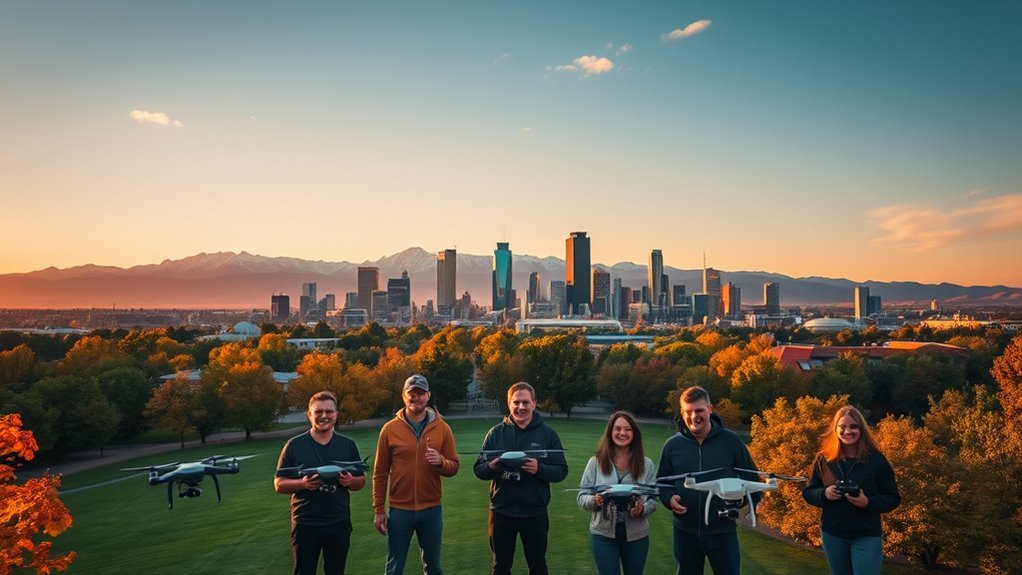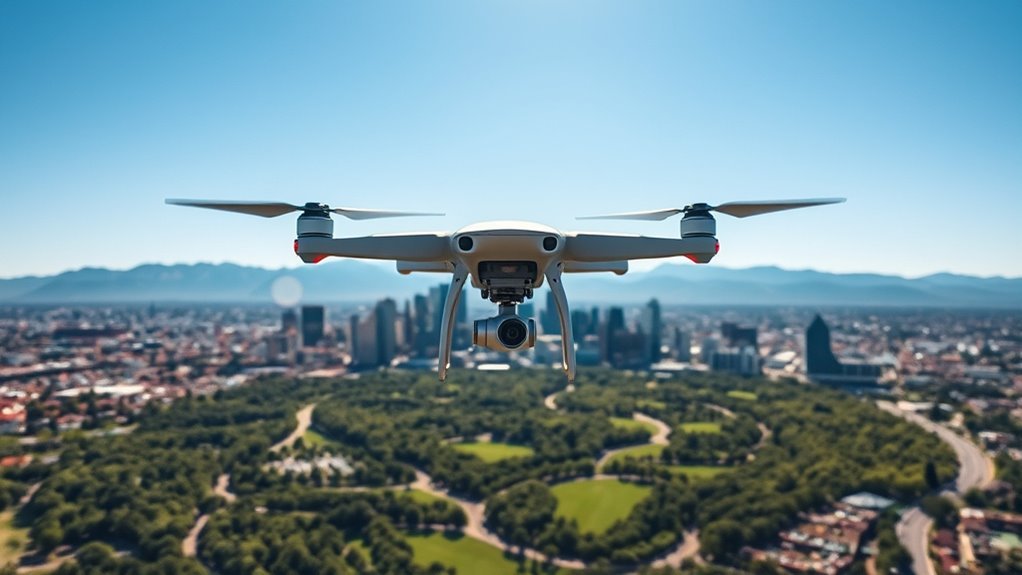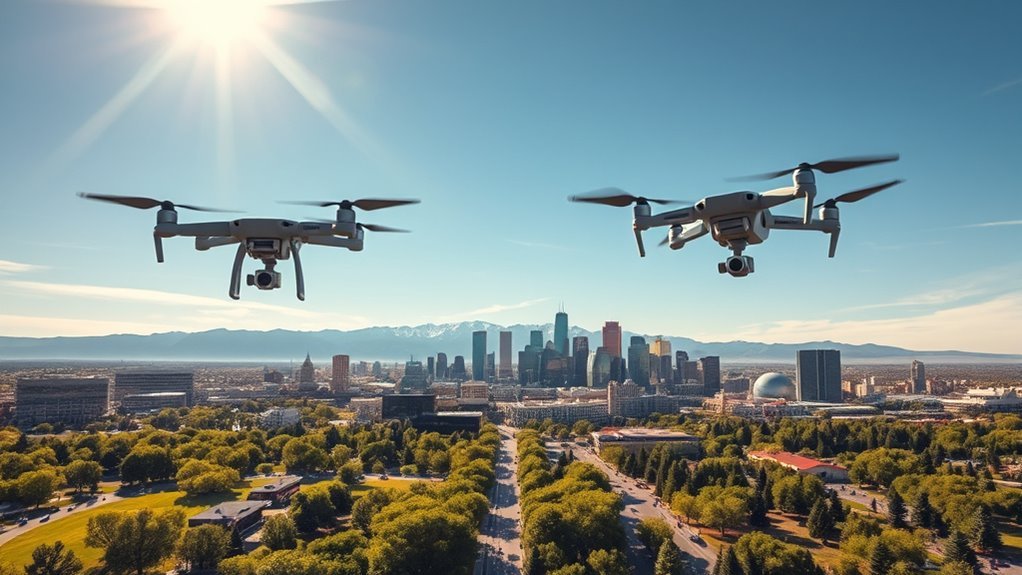To legally fly drones in Denver, you must follow federal FAA regulations, comply with Colorado state laws, and adhere to local ordinances. Make sure your drone’s registered if it weighs over 0.55 pounds, and keep it within visual line-of-sight. Be aware of no-fly zones, especially near airports and military areas. Familiarize yourself with necessary certifications and consider insurance coverage. By understanding these essential guidelines, you’ll be equipped to operate your drone safely and responsibly. There’s more to uncover about specific rules and practices.
Understanding Federal Regulations for Drone Flight

While traversing the skies with a drone can be an exhilarating experience, it’s vital to understand the federal regulations that govern these flights. The Federal Aviation Administration (FAA) mandates that you adhere to specific guidelines to guarantee drone safety. Before taking off, proper flight planning is important; you should know your drone’s weight class, maximum altitude limits, and airspace restrictions. Registering your drone is also a requirement for most models over 0.55 pounds. Additionally, you must keep your drone within visual line-of-sight and avoid flying over people or moving vehicles. By familiarizing yourself with these regulations, you can enjoy the freedom of flight while maintaining compliance and safety for yourself and others.
Navigating Colorado State Drone Laws

When operating drones in Colorado, you need to understand both state regulations and local ordinances that could affect your flight. Colorado has specific laws that govern drone use, and local jurisdictions may impose additional restrictions. Familiarizing yourself with these rules guarantees compliance and enhances safety during your operations.
State Regulations Overview
As you navigate Colorado’s drone laws, it’s essential to understand the state’s specific regulations that govern UAV operation. Colorado mandates drone operators to comply with safety guidelines and guarantees proper drone insurance coverage. Additionally, you must be aware of flight restrictions that may apply in certain areas.
Here’s a quick overview of critical regulations you should keep in mind:
| Regulation | Description |
|---|---|
| Insurance Requirement | Operators must carry drone insurance |
| Maximum Altitude | Limit of 400 feet above ground level |
| No-Fly Zones | Restricted areas include airports and military |
| Night Flights | Permission required for nighttime operations |
| Registration | Drones over 0.55 lbs must be registered |
Stay informed to enjoy your flying experience freely and safely!
Local Ordinances Impact
Understanding local ordinances is essential for drone operators in Denver, as these regulations can greatly impact your flying experience. Local laws often dictate where you can fly, requiring impact assessments for operations in sensitive areas. Engaging with the community is vital; local stakeholders may have input on drone activities, influencing regulations and your ability to operate freely. Failure to adhere to these ordinances can result in fines or restricted access to certain areas. Always check for updates on local laws, as they can change based on community feedback or safety concerns. By staying informed and participating in community engagement, you can navigate local ordinances effectively, ensuring a more enjoyable and compliant flying experience.
Local Ordinances and Restrictions in Denver

When operating drones in Denver, it’s essential to understand the city’s specific regulations and any restricted airspace areas. Local ordinances may impose additional requirements beyond state laws, impacting where and how you can fly. Familiarizing yourself with these rules will guarantee compliance and enhance safety during your drone operations.
City Drone Regulations
While maneuvering the skies with your drone in Denver, it’s important to be aware of the city’s specific regulations and restrictions. Denver has established local ordinances to guarantee safe drone operation, especially regarding drone delivery services and aerial photography ethics. You must keep your drone within visual line of sight and avoid flying over people or private property without permission. Additionally, certain parks and open spaces may have restrictions on drone use, so check local guidelines before taking off. Always respect privacy and adhere to ethical standards in aerial photography to maintain a good relationship with the community. By understanding these city regulations, you can enjoy the freedom of flying your drone while staying compliant and responsible.
Restricted Airspace Areas
Before you take to the skies, it’s important to know that certain areas in Denver are designated as restricted airspace, which can greatly impact where you can legally operate your drone. These restricted drone zones often include areas near airports, government buildings, and other sensitive locations. Familiarizing yourself with airspace classifications is vital; Class B, C, and D airspaces impose specific restrictions that may limit your flight options. Be sure to check local ordinances, as they may impose additional regulations on drone usage. Ignoring these restrictions could lead to legal consequences or unsafe situations. Always stay informed about your surroundings to guarantee a responsible and enjoyable flying experience while exercising your freedom to explore the skies.
Registering Your Drone: What You Need to Know
To legally operate a drone in Denver, you must navigate the registration process established by the Federal Aviation Administration (FAA). This process is crucial for ensuring safety and compliance. Here’s what you need to prepare:
- Drone Information: Gather details like the make, model, and serial number.
- Owner Information: Provide your name, address, and contact information.
- Registration Fee: Prepare to pay a small fee, typically around $5.
- Required Documentation: Have your identification ready, such as a driver’s license.
Completing this drone registration process not only grants you the freedom to fly but also signifies your commitment to responsible drone operation. Don’t skip this essential step!
Required Certifications for Drone Pilots
Once you’ve registered your drone, the next step is obtaining the necessary certifications to operate it legally, especially if you’re planning to fly for commercial purposes. The Federal Aviation Administration (FAA) requires you to complete pilot training and obtain a Remote Pilot Certificate. This involves passing a knowledge test that covers airspace regulations, weather, and drone operations.
There are two primary certification types: Part 107 for commercial operations and the Section 333 Exemption for specific use cases. If you’re flying recreationally, you still need to follow safety guidelines but don’t require a certification. Verify you stay informed about updates to regulations, as they can impact your flying experience and freedom in the skies.
No-Fly Zones: Areas to Avoid in Denver
While flying your drone in Denver can be an exhilarating experience, it’s crucial to be aware of no-fly zones that restrict drone operations. Ignoring these areas can jeopardize drone safety and violate local laws. To guarantee compliance and practice proper flight etiquette, steer clear of the following:
- Near Airports: Stay at least five miles from Denver International Airport.
- Government Buildings: Avoid flying over sites like the Denver City and County Building.
- Parks: Some parks, such as Washington Park, have restrictions on drone use.
- Emergency Scenes: Never drone near active emergency situations, as it can interfere with responders.
Tips for Safe and Responsible Drone Flying
Understanding no-fly zones is just the beginning of responsible drone operation in Denver. To guarantee drone safety, always check local regulations and airspace requirements before flying. Maintain visual line-of-sight with your drone at all times, and avoid flying over people or private property without permission. Be mindful of weather conditions, as strong winds and precipitation can affect your drone’s performance. Additionally, consider the time of day; flying during daylight enhances visibility and safety. Practice responsible flying by adhering to altitude limits and keeping your drone within a safe distance from other aircraft. Finally, always respect wildlife and natural areas, minimizing your impact on the environment. By following these tips, you can enjoy the freedom of flying while guaranteeing a safe experience for everyone.
Insurance Considerations for Drone Operators
As you explore the skies with your drone, it’s essential to take into account the importance of insurance for your operations. Without proper coverage, you risk financial consequences that can be overwhelming. Here are some key insurance types to take into consideration:
- Liability Coverage: Protects you against claims for damage or injury caused by your drone.
- Hull Insurance: Covers physical damage to your drone in case of accidents.
- Payload Insurance: Safeguards any equipment or cargo you’re transporting.
- Commercial Insurance: Necessary if you’re using your drone for business purposes, ensuring legal compliance.
Resources for Staying Updated on Drone Regulations
To guarantee you remain compliant with ever-evolving drone regulations, it is crucial to tap into reliable resources that provide up-to-date information. Regularly checking these sources will keep you informed about drone news and regulatory updates that could impact your flying experience. Additionally, staying aware of specific restrictions on aerial photography and operational guidelines will help ensure safe and lawful flights. Understanding privacy regulations is also essential to navigate the complexities of drone usage responsibly.
| Resource Type | Description | Link |
|---|---|---|
| Government Websites | Official regulations and updates | [FAA.gov](https://www.faa.gov) |
| News Aggregators | Curated drone industry news | [DroneDJ](https://www.dronedj.com) |
| Community Forums | Discussions and shared experiences | [DJI Forum](https://forum.dji.com) |
Frequently Asked Questions
Can I Fly My Drone at Night in Denver?
You can fly your drone at night in Denver, but you must adhere to night flying regulations and guarantee your drone meets visibility requirements. Using proper lighting is essential for safe nighttime operations.
What Are the Penalties for Flying a Drone Illegally?
Imagine soaring freely through the night sky, but if you fly illegally, you could face hefty fines incurred and serious legal repercussions. It’s vital to know the rules to keep your aerial adventures enjoyable and safe.
Do I Need a License to Fly for Recreational Purposes?
For recreational flying, you don’t need a license, but you must follow drone regulations. Make sure you’re familiar with local laws to enjoy your freedom while flying safely and responsibly in designated areas.
Can I Use My Drone for Commercial Photography?
If you’re capturing stunning aerial shots for a wedding, you’ll need to comply with photography regulations. For commercial use, make sure you’ve obtained the necessary certifications and permissions to legally operate your drone in that capacity.
How Do I Report a Drone-Related Incident in Denver?
To report a drone-related incident in Denver, contact local authorities or the FAA. Make sure you provide details on the incident, emphasizing drone safety and incident reporting for effective response and resolution. Stay informed and proactive.

